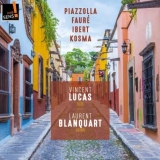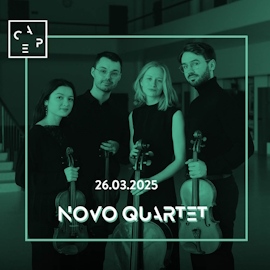Astor Piazzollas Histoire du Tango gibt der CD ihren Titel, ohne das längste Werk im Programm zu sein. Interpretatorisch ragt die Komposition allerdings heraus. Die beiden Franzosen Vincent Lucas und Laurent Blanquart sind geographisch weit entfernt von Piazzollas Argentinien, aber sie erfassen und projizieren den Geist dieser Musik sehr gut. Das oft lebhafte und fröhliche Zusammenspiel der beiden Instrumente in den drei schnellen Stücken Bordel 1900, Night Club 1960 und Concert d’aujourd’hui ist hinreißend. Weniger gefällt Vincent Lucas’ etwas vibratoreiches Spiel in Café 1930 mit seinen nachdenklicheren und pastoraleren Momenten.
Die Petite Suite Médiévale von Francis Paul Demillac erklingt in einer zarten und einfühlsam charmanten Interpretation und auch die übrigen kleineren Stücke sind angenehm zu hören, mit Ausnahme der Transkription von Faurés Après un rêve. Wieso Vincent Lucas diese fürs Ohr schon fast schmerzhaft unausgeglichene und unschöne Aufnahme freigeben konnte, ist mir ein Rätsel.
Auch im Grand Duo Concertante von Mauro Giuliani ist Lucas im Andante atemtechnisch überfordert und sündigt mit penetrantem Vibrato. Die brillanteren übrigen Sätze gelingen ihm hingegen sehr gut.
Durchgängig höchst beeindruckend ist das sehr sensible, nuancenreiche und ausdrucksvolle Spiel des Gitarristen Laurent Blanquart.
Die Tonaufnahme ist ebenfalls tadellos und bestens ausgeglichen.
Astor Piazzolla’s Histoire du Tango gives the CD its title without being the longest work in the programme. The composition, however, stands out in terms of interpretation. The two Frenchmen Vincent Lucas and Laurent Blanquart are geographically far away from Piazzolla’s Argentina, but they capture and project the spirit of this music very well. The often lively and cheerful interplay of the two instruments in the three fast pieces Bordel 1900, Night Club 1960 and Concert d’aujourd’hui is captivating. With Vincent Lucas’s vibrato-filled playing, Café 1930 is less convincing. The Petite Suite Médiévale by Francis Paul Demillac can be heard in a delicate and sensitive performance, and the other smaller pieces are also pleasant to listen to, with the exception of the transcription of Fauré’s Après un rêve. Why Vincent Lucas allowed to release this almost painfully unbalanced and unappealing recording is a mystery to me. In the slow movement of Giuliani’s Grand Duo Concertante Lucas’s strong vibrato is annoying too. In the more brilliant movements his playing is very successful. The very sensitive, nuanced and expressive playing of guitarist Laurent Blanquart is consistently highly impressive. The sound recording is also impeccable and perfectly balanced.






















